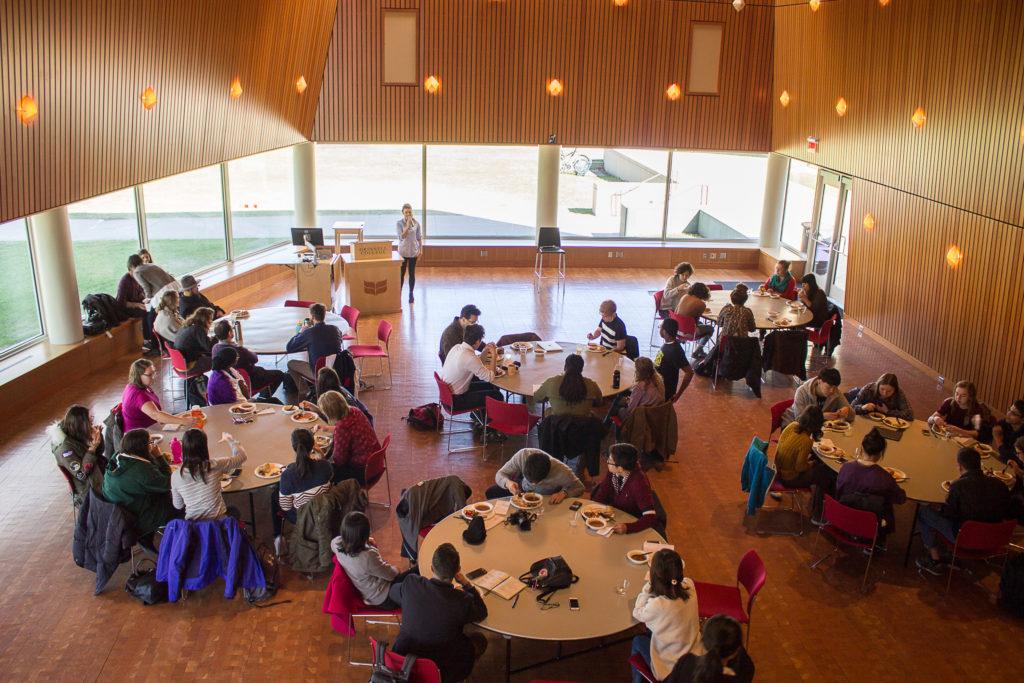
Three professors gathered in JRC 101 on Thursday, March 6 to speak about their experiences coming to the United States and navigating their multiple identities here. The event, “Professors Without Borders: Identity and Sense of Belonging,” featured Professors Gemma Sala, political science, Marc Chamberland, mathematics, and Yee Mon Thu, biology.
The event was organized by three students, Danica Bojovic ’19, Erhaan Ahmad ‘18 and Anastasiia Morozova ’18. The Office of International Student Affairs sponsored the event in an effort to kick-start discussion about how migration across borders creates challenges while also presenting opportunities.
Yee Mon Thu, who comes from Myanmar (formerly known as Burma) spoke about her struggle with English, which she has slowly been overcoming.
“At the beginning you miss home, and then you miss this kind of food, and you miss speaking in your own language, and you struggle speaking English,” she said. “I used to directly translate what I was thinking in my head into English, and then sometimes it didn’t really work … however I noticed more and more I don’t directly translate any more and I started thinking in English.”
As Yee Mon Thu has spent more time here, she has found herself changing in small ways that add up.
“I used to think that eating salad is a little weird for me, because in Asia we don’t really eat vegetables raw, so now I actually like salad,” Yee Mon Thu said.
Sala, who is from Spain, did not set out with the goal to become an American, but rather stayed in the US because she was provided an opportunity to teach at Grinnell.
“I thought I had this short-term opportunity to go to graduate school in the United States, and I remember my mother crying when I got that fellowship, and I told her that it was just going to be a couple years. … So I didn’t come to move here, to become an American, and now I feel like I’m being more and more forced to become one,” Sala said.
However, though America has changed her, Sala believes she will never truly be American.
“I guess that I’m going to be an outsider forever,” Sala said. “I have this accent that I know will never go away — that’s a perpetual reminder. And there are things that, for better or worse, I’ve never been adjusted to. … Here you have to go back to work after dinner, which just destroys the whole thing.”
Sala’s feeling of being ‘other’ is reinforced by how many Americans treat her, such as what recently happened when she was returning from a trip abroad.
“I’ve just come back from a trip to the UK and coming in, I’m now allowed to go in the line with my husband and my child, but they say ‘Welcome back to them’ but not to me,” Sala said.
While Chamberland, who is from Canada initially also felt a strong sense of identity, he has come to thinking of himself as an American.
“When I first came to Grinnell, for the first handful of years, I very much thought about my Canadian identity. … I would even tell my class, ‘look, the whole English world says Zed, not Zee, for the last letter of the alphabet,’” Chamberland said. “What I didn’t expect to happen is after being here now for almost 20 years, I’ve largely lost that feeling … And I found myself surprised last summer when I was in France talking to some people there. In the past what I’ve often said ‘I’m a Canadian, but I just live in the United States’ … and then last summer talking to people I would just say I’m American.”



























































